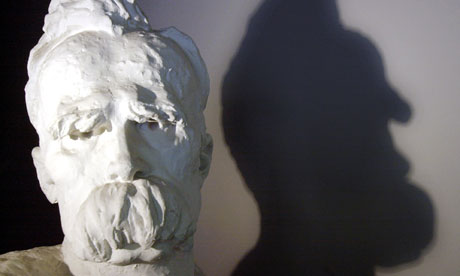Carl Jung, part 8:
Jung thought psychology could offer a language for grappling with moral ambiguities in an age of spiritual crisis

Friedrich Nietzsche: 'We godless anti-metaphysicians still take our fire… from the flame lit by a faith that is thousands of years old.' Photograph: Jens Meyer/AP
In 1959, two years before his death, Jung was interviewed for the BBC television programme Face to Face. The presenter, John Freeman, asked the elderly sage if he now believed in God. "Now?" Jung replied, paused and smiled. "Difficult to answer. I know. I don't need to believe, I know."
What did he mean? Perhaps several things.
He had spent much of the second half of his life exploring what it is to live during a period of spiritual crisis. It is manifest in the widespread search for meaning – a peculiar characteristic of the modern age: our medieval and ancient forebears showed few signs of it, if anything suffering from an excess of meaning. The crisis stems from the cultural convulsion triggered by the decline of religion in Europe. "Are we not plunging continually," Nietzsche has the "madman" ask when he announces the death of God. "Is not the greatness of this deed too great for us?"
Jung read Nietzsche and agreed that it was. The slaughter of two world wars and, as if that were not enough, the subsequent proliferation of nuclear weaponry were signs of a civilisation swept along by unconscious tides that religion, like a network of dykes, once helped contain. "A secret unrest gnaws at the roots of our being," he wrote, an unrest that yearns for the divine. Nietzsche agreed that God still existed as a psychic reality too: "We godless anti-metaphysicians still take our fire … from the flame lit by a faith that is thousands of years old." And now the flame is out of control.
The sense of threat – real and imagined – that Jung witnessed during his lifetime has not lessened. Ecologists such as James Lovelock now predict that the planet itself has turned against us. Or think of the war games that power an online gaming industry worth £45bn and counting. Why do so many spend so much indulging murderous fantasies?
You could also point to the proliferation of new age spiritualities that take on increasingly fantastical forms. One that interested Jung was UFOs: the longing for aliens – we are without God but not without cosmic companions – coupled to tales of being "chosen" for abduction, are indicative of mass spiritual hunger.
Or you might ask why a key characteristic of western culture is widespread overwork. Like the economist John Maynard Keynes, Jung wondered whether modern individuals are trying to atone for an ill-defined sense of moral failure: we are no longer sure what makes something valuable, bar an arbitrary designation of financial worth, and this transforms the humdrum need for money into a kind of worship of money.
But if the world has rejected God, those who remain religious are, in part, to blame.
They have suffered a loss of confidence too, Jung suggests. The powerful, fearful experience of the numinous that speaks of the mystery of life has been traded in for a variety of substitutes that no longer speak to the depths of our humanity or serve our spiritual yearning.
Again, this shift is variously manifest. Theologians, for instance, will often feel more comfortable speaking of religious matters in the worldly language of the social sciences. Christians will tell you that when Jesus spoke of the kingdom of God he was really conveying a practical political vision. Or they might reduce the symbols of faith to historical events: it is as if someone with a camera outside Jerusalem, on that Sunday in 33AD, could have caught the resurrection on film.
It's a process that empties faith of significance because it turns symbols into signs: symbols transmit an immediate experience that addresses the soul, whereas signs just point to facts. "We simply do not understand any more what is meant by the paradoxes contained in dogma; and the more external our understanding of them becomes the more we are affronted by their irrationality."
It is perhaps this craving for immediate experience that drives the highly emotional forms of religion growing so fast in the contemporary world, though Jung would have discerned a sentimentality in them that again simplifies humankind's moral ambiguities and spiritual paradoxes. He did not believe that authentic religiosity was expressed in these peak experiences. Rather he advised people to turn towards their fears, much as the mystics welcomed the dark night of the soul. This shadow is experienced as a foe, but it is really a friend because it contains clues as to what the individual lacks, rejects and distrusts.
"What our age thinks of as the 'shadow' and inferior part of the psyche contains more than something merely negative," he writes in The Undiscovered Self, an essay published in 1957. "They are potentialities of the greatest dynamism." That dynamism works by way of compensation. It aims to rebalance what has become lopsided. Hence, if at a conscious level the scientific has eclipsed the theological, the material the valuable, the emotive the spiritual, then the forces that hide in the unconscious will ineluctably make themselves felt once more. It will seem chaotic and quite possibly be destructive. But the passion also contains a prophetic voice calling humanity back to life in all its fullness.
Jung is often criticised by religious thinkers for his poor theology and perennial philosophy. They are often correct, but they can also miss the main point. Jung was clear that his analytical psychology was not a new religion, neither was he a guru. "Psychology is concerned with the act of seeing and not with the construction of new religious truths," he wrote.
So its role is to provide a language for grappling with what's at stake. "Since the stars have fallen from heaven and our highest symbols have paled, a secret life holds sway in the unconscious. That is why we have a psychology today, and why we speak of the unconscious. All this would be quite superfluous in an age or culture that possessed symbols."
Symbols do die. "Why have the antique gods lost their prestige and their effect upon human souls? It was because the Olympic gods had served their time and a new mystery began: God became man." Which raises the question of whether the Christian dispensation has now served its time too and we await a new mystery. Perhaps we do live on the verge of a new age, of another transformation of humanity.

No comments:
Post a Comment